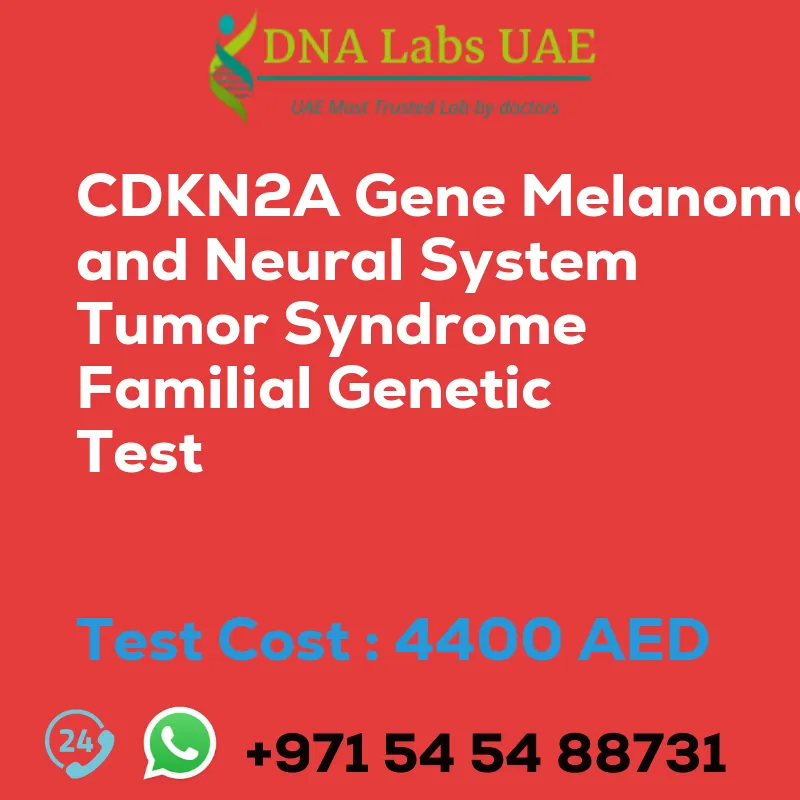CDKN2A Gene Melanoma and neural system tumor syndrome familial Genetic Test
The CDKN2A gene is a tumor suppressor gene that plays a critical role in regulating cell growth and division. Mutations in this gene have been associated with an increased risk of developing certain types of cancer, including melanoma and neural system tumors.
Melanoma and neural system tumor syndrome, also known as familial atypical multiple mole melanoma (FAMMM) syndrome, is an inherited condition characterized by an increased risk of developing melanoma and other types of skin cancer, as well as neural system tumors such as glioma.
NGS (Next-Generation Sequencing) genetic testing is a powerful tool that allows for the simultaneous analysis of multiple genes, including CDKN2A, to identify any mutations or genetic variants that may be associated with an increased risk of developing melanoma and neural system tumors.
By performing an NGS genetic test, individuals with a family history of melanoma and neural system tumors can determine if they carry any genetic mutations in the CDKN2A gene or other relevant genes that may increase their risk of developing these cancers.
This information can be used to guide personalized screening and prevention strategies, as well as inform family members about their own risk and the need for regular monitoring.
It is important to note that a positive genetic test result does not guarantee that an individual will develop cancer, but it does indicate an increased risk. Additionally, a negative test result does not completely eliminate the possibility of developing cancer, as there may be other genetic and environmental factors at play. Genetic testing should always be interpreted in the context of a person’s family history and other risk factors.
Test Details
- Test Name: CDKN2A Gene Melanoma and neural system tumor syndrome familial Genetic Test
- Components: NGS Technology
- Price: 4400.0 AED
- Sample Condition: Blood or Extracted DNA or One drop Blood on FTA Card
- Report Delivery: 3 to 4 Weeks
- Test Type: Cancer
- Doctor: Oncologist
- Test Department: Genetics
- Pre Test Information: Clinical History of Patient who is going for CDKN2A Gene Melanoma and neural system tumor syndrome, familial NGS Genetic DNA Test. A Genetic Counselling session to draw a pedigree chart of family members affected with CDKN2A Gene Melanoma and neural system tumor syndrome, familial NGS Genetic DNA Test gene CDKN2A
| Test Name | CDKN2A Gene Melanoma and neural system tumor syndrome familial Genetic Test |
|---|---|
| Components | |
| Price | 4400.0 AED |
| Sample Condition | Blood or Extracted DNA or One drop Blood on FTA Card |
| Report Delivery | 3 to 4 Weeks |
| Method | NGS Technology |
| Test type | Cancer |
| Doctor | Oncologist |
| Test Department: | Genetics |
| Pre Test Information | Clinical History of Patient who is going for CDKN2A Gene Melanoma and neural system tumor syndrome, familial NGS Genetic DNA Test. A Genetic Counselling session to draw a pedigree chart of family members affected with CDKN2A Gene Melanoma and neural system tumor syndrome, familial NGS Genetic DNA Test gene CDKN2A |
| Test Details |
The CDKN2A gene is a tumor suppressor gene that plays a critical role in regulating cell growth and division. Mutations in this gene have been associated with an increased risk of developing certain types of cancer, including melanoma and neural system tumors. Melanoma and neural system tumor syndrome, also known as familial atypical multiple mole melanoma (FAMMM) syndrome, is an inherited condition characterized by an increased risk of developing melanoma and other types of skin cancer, as well as neural system tumors such as glioma. NGS (Next-Generation Sequencing) genetic testing is a powerful tool that allows for the simultaneous analysis of multiple genes, including CDKN2A, to identify any mutations or genetic variants that may be associated with an increased risk of developing melanoma and neural system tumors. By performing an NGS genetic test, individuals with a family history of melanoma and neural system tumors can determine if they carry any genetic mutations in the CDKN2A gene or other relevant genes that may increase their risk of developing these cancers. This information can be used to guide personalized screening and prevention strategies, as well as inform family members about their own risk and the need for regular monitoring. It is important to note that a positive genetic test result does not guarantee that an individual will develop cancer, but it does indicate an increased risk. Additionally, a negative test result does not completely eliminate the possibility of developing cancer, as there may be other genetic and environmental factors at play. Genetic testing should always be interpreted in the context of a person’s family history and other risk factors. |








